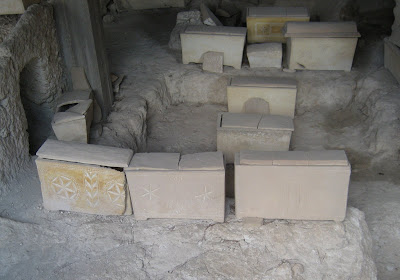 In his compelling lecture on how a scholar should go about establishing the authenticity of an ancient inscription, whether on an ossuary or in some other form, Barkay provides us with 10 points that need to followed to get to the bottom of the matter. I find myself very much in agreement with what he says. This brief lecture is excellent and is presented on the BAR website. Among other things he stresses that it is too extreme a view to suggest we should ignore unprovenanced artifacts, or simply assume they are forged. Here is the link--- see what you think.
In his compelling lecture on how a scholar should go about establishing the authenticity of an ancient inscription, whether on an ossuary or in some other form, Barkay provides us with 10 points that need to followed to get to the bottom of the matter. I find myself very much in agreement with what he says. This brief lecture is excellent and is presented on the BAR website. Among other things he stresses that it is too extreme a view to suggest we should ignore unprovenanced artifacts, or simply assume they are forged. Here is the link--- see what you think. http://forgerydownload.webtransit.com/biblical_arch.mp3
If this link does not work go to www.bib-arch.org and look under the James ossuary bits and click on the Gabby Barkay link.
That guy said "uh" at least 430 times. That is a rough count. That's got to be a new all-time record.
ReplyDeleteConsidering he is a modern Israeli Hebrew thinking in Hebrew, but speaking in English you need to cut him some slack.
ReplyDeleteBW3
P.S. Especially if the shoe was put on the other foot and we were in the position of having to speak modern Israeli Hebrew. I can't do it very well at all-- since Biblical Hebrew is different in many ways. I would have said about a zillion duhs, or uhs in the process.
ReplyDeleteThanks for posting that Ben. I found where he talked about anomalous discoveries to be very interesting.
ReplyDeleteAlso when he talked about the leading role of experts in the field of humanities... James Cameron was waiting for him to mention the importance of filmmakers but alas James was to be disappointed.
lol Of course. I could tell from his accent that he must have been from somewhere in the Middle East. He had some very good thoughts on the process. I agree his approach is well thought out and as unbiased as it could be.
ReplyDeleteBlessings!
Very interesting. Thank you for sharing.
ReplyDeleteDr. Witherington,
ReplyDeleteThis is slightly off subject, but I've been reading Patricia Rosenmeyer's "Ancient Epistolary Fictions" and was wondering what you would say if someone asked you for proof that the Pauline corpus we have in our Bibles is the genuine work of the historical Paul and not the pseudonymous work of later forgers, bearing in mind that the authors of the titular epistolary fictions would have been keen to maintain the illusion of verisimilitude and plausibility.
Hi JD: I have answered this question in detail in the opening of my Letters and Homilies for Hellenized Christians Vol. One. The answer is, the evidence is against such an idea. Ancients had a clear notion of forgery and intellectual property and pseudonymity was widely condemned on these grounds when it came to personal letters.
ReplyDeleteBW3
Dr. Witherington:
ReplyDeleteSo then do you believe Paul authored Ephesians and what is your opinion of Goodspeed and Knox's theory that it was written as a cover letter to the collection of the Pauline corpus?
Hey Ben,
ReplyDeleteI am working my way through "The Living Word of God" and discussing it chapter by chapter over on my own blog. I'm struggling to get my head wrapped around what you are trying to say in one chapter. If you've got time, it would be a great help if you could come over and help me work it out.
Thanks!
Nick
http://fumblingtowardseternity.wordpress.com
Off Topic:
ReplyDeleteDr. Witherington, I'm representing New Covenant KG Foundation, a 501(c)3 org that wants to give to your ministry, do you have a mechanism by which to accept donation?
Hello Brother Laurens. Contact me through my email address--- benw333@hotmail.com
ReplyDeleteBlessings,
Ben
P.S. To Nick--- sorry Nick, I am swamped with exams etc. just now.